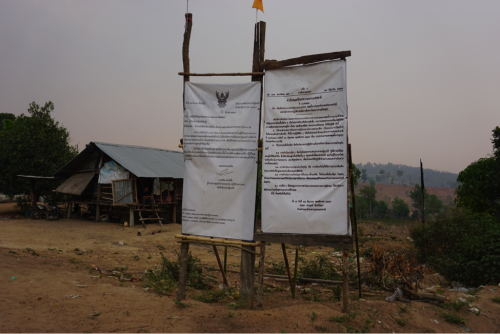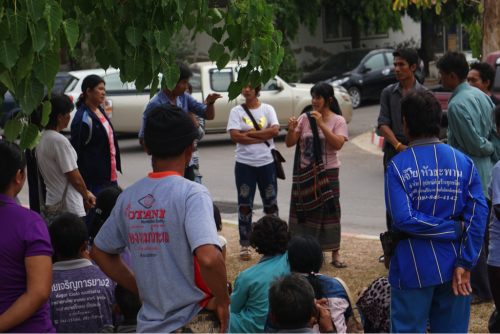CHAIYAPHUM – One thousand people from six communities in a national park in Chaiyaphum province gained a partial victory in their long-standing fight against eviction after negotiating an extension with state officials on Thursday as the military government continues to crack down on communities established inside park boundaries across the country.

Signs placed in the middle of one of the communities by the Department of National Parks are the government’s way of communicating information about the looming eviction of six communities in Sai Thong National Park in Chaiyaphum province.
On Thursday afternoon, villagers from six communities in Sai Thong National Park met with the Vice Governor of Chaiyaphum Province Ukrit Pungsopha and representatives from the Ministry of Natural Resources and the Royal Forest Department over their looming eviction under a government reforestation project.
Dozens communities across Northeast Thailand have faced eviction in recent years under the military government’s Order 64/2014, which enables authorities to remove residents living on national reserve lands in the name of restoring the forest. Though the number of affected villagers across Thailand remains unclear, communities in Sam Chai and Kham Muang districts in Kalasin province, Ban Kao Bath in Non Dindaeng district, Buriram province, and Phu Phan district in Sakon Nakhon province all faced eviction in 2014.
The government order aims to increase forest cover in the country to 40% within ten years but has been criticized for resulting in the evictions of thousands of residents in long-established communities.
The Chaiyaphum meeting was held at the request of community leaders who, frustrated by unyielding Park officials, had submitted a formal letter to eight offices including that of Prime Minister Prayuth Chan-ocha, the National Human Rights Committee, the Ministry of Natural Resources, and the Governor of Chaiyaphum earlier this month. In the letter, community representatives asked the government to set up a bipartisan committee and investigate allegations of National Park officials’ harassment of villagers.
Since Sai Thong National Park was established in 1992, under a government project to restore forest areas, communities located within the defined park boundaries have been struggling to find an agreement with officials from the Department of National Parks. Two Chaiyaphum villages within the park area had achieved legal status to remain in the area, but the five communities represented in Thursday’s meeting had not been included in those negotiations.
In the last two months the tensions between villagers and National Park officials had escalated. In a meeting on February 25th, villagers asked the officials where they would live if the government took their land. Residents say that officials had no plans to help resettle them elsewhere. “That’s up to you,you can go anywhere,” multiple villagers recall the officials said.

Oranut Phonphinyo (center) has worked with many communities facing eviction in the Northeast advising them on their rights and how to present their testimonies to officials.
However, in Thursday’s meeting Vice Governor Ukrit promised that the villagers would be allowed to continue farming the disputed land for the time being. He also agreed to set up a committee to dismantle the encroaching evictions and hold a public hearing to discuss ways to legally return land to the communities.
“Some [National Park] officials try to make their boss proud by reforesting the most land, without knowing their actions actually affect the villagers,” said Vice Governor Ukrit expressing some support for the villagers.
Oranut Phonphinyo, a community organizer of the Land Reform Network of Thailand said that a committee would help in finding a solution but the continuous involvement of the Vice Governor was needed.
The Vice Governor’s concession encouraged villagers, but they continue to worry about their relationship with the Department of National Parks, which was not present at the meeting. For now, villagers won’t be evicted, but their status hinges on the cooperation of a variety of different government offices and the findings of the newfound committee.
As the roughly 50 community members who had traveled to the Governor’s office in support of their leaders gathered outside after the meeting, Ms. Oranut exclaimed to the group, “If this is war, this is our first victory.”





